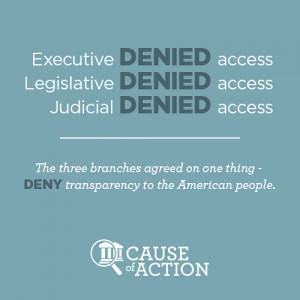Today, the Court of Appeals for the D.C. Circuit heard oral arguments in Cause of Action Institute’s lawsuit against Secretary of State John Kerry and Archivist of the United States David Ferriero. The case originally sought to enforce the officials’ Federal Records Act duties to initiate action through the Attorney General and notify Congress because they were unable to retrieve all of the federal records former Secretary of State Hillary Clinton unlawfully removed from the State Department by setting up a personal email server to conduct official government business. The district court below dismissed the case as moot because that court believed the State Department had recovered enough of the records and taken enough action short of initiating action through the Attorney General. The oral argument heard today was on the appeal of that decision.
CoA Institute Vice President John Vecchione argued the case, which was consolidated with a similar case filed by Judicial Watch. The three-judge panel was engaged on the issues and asked probing questions of both sides.


